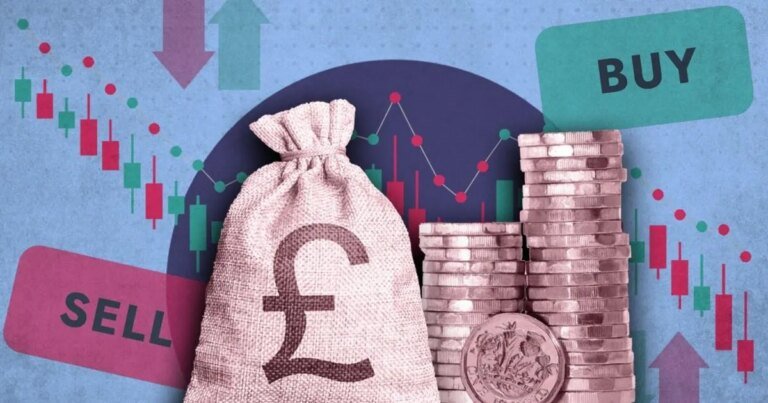
Metro’s weekly column, Where to Invest, is for anyone looking for fresh ideas and insight into where they might put their savings.
This week, we ‘re going back to basics, refreshing readers on the essential lingo and breaking down a word you’re going to love: compounding.
Get to grips with the lingo
FTSE100 – the top 100 most valuable companies listed on the London Stock Exchange
MSCI World Index – the majority of large and middle-sized companies listed on stock exchanges in developed markets
Return / yield – the percentage your money goes up or down by over a one-year period
Fund – a bucket of money invested into lots of different companies
Active fund – a fund with a fund manager who chooses which companies to invest in
Passive / tracker / ETF – funds without a manager which invest in a fixed group of companies according to a set of pre-agreed rules eg. all companies in the FTSE 100
Stock / share / equity – a share of one company
Bond – a share of a loan made by a group of investors to one company
Dividend – a share of the company’s profit paid out to the shareholders
Tax wrapper – a type of savings or investing account such as an Isa or pension where you don’t pay tax on the income earned or the capital gain when you sell investments within in that account
While it’s true that money you invest can go up and down in value as markets rise and fall, it’s also true that the most important principle when it comes to investing successfully is time.
Setting aside the tangle of words like trusts, funds, yields, returns and the rest for a moment, all you really need to know is that so long as you leave the money you invest alone, over time it’s highly unlikely you’ll end up with less than you put in.
There’s a magic to this – it’s called compounding.
What is compounding?
Rajan Lakhani, head of money at savings app Plum, says: ‘Compounding is simply when you earn money on your money.
‘So when you get interest on the money you save, that increased sum also earns interest and the cycle continues so your money grows.’

It works like this:
You invest £10 into a company share. Once a quarter, usually, you’ll receive a dividend – your share of the company’s profit.
Let’s say that dividend is £1 – that’s 10% of your original investment.
You could take that £1 as income and spend it. Or, you could reinvest it so you have £11 invested in that company.
Next quarter, your dividend is 10% of £11, so you receive £1.10.
You reinvest that again and the following quarter you’ll get 10% of £12.10, giving you another £1.21. Reinvested again, that takes your investment to £13.31.
Reinvesting three dividend payments has lifted the value of your money by a third – 33%.
By comparison, had you taken each dividend as income you’d have received £1 each quarter, leaving you with a £10 share in the company.
These numbers are just indicative but they show what a massive boost compounding gives your money.
While the underlying value of the share is highly unlikely to stay the same in all that time, if you’re reinvesting whatever dividends you receive, you’re benefitting from compounding.

‘Compound growth is a formidable force,’ Laith Khalaf, head of investment analysis at investing platform AJ Bell, says. ‘Though you do have to be diligent and patient to harness its power.
‘Clearly the higher the return you achieve on your investments, the more powerful the effect of compound growth on your wealth.’
Cash vs investing
How does this compare to cash savings? It’s all dependent on the amount of income you receive.
Currently, the best buy cash Isa is with Hargreaves Lansdown and pays 4.55%.
While that is more than the 3.2% forecast payments across the whole of the FTSE100, according to AJ Bell, that covers a wide range of dividend returns on a company by company basis.
For example, insurance company Legal & General is expected to return 9.2% this year, insurer Phoenix 8.6%, fund management group M&G 8.1% and Sainsbury’s 7.2%.
Lindsay James, investment strategist at Quilter, says: “Leaving a £10,000 sum in a savings account generating 3% per year will see you receive interest of nearly £3,500 after 10 years.
‘But over time, equity market returns exceed returns on cash. If you were to invest your money for the same period in a global equity index such as the MSCI World Index, then using long-term return assumptions it could grow to over £17,000.’

Patience is key. Chris Ball, chief executive of Hoxton Wealth, says: ‘Compounding needs years, not days, to work and while downturns might feel like the end of the world they almost certainly won’t be.
‘The investors who win aren’t the smartest – they’re the ones who stay in the game the longest.’
What is diversification?
If you want to make the most of compounding and keep your risk down, then you need to diversify.
Diversification simply means, don’t put all your eggs in one basket.
Investing in one company is risky because there’s no guarantee that it will pay a dividend and there’s always the possibility it could go bust – losing you all your money.
This is why it’s important to invest in a range of companies. A lot of people do this by investing in funds, which invest in multiple companies. It’s a good idea to invest in more than one fund too.
Diversifying also relates to the type of company you’re invested in and where it’s based.
For example, it’s higher risk to invest in just the UK, just the US or just Europe than it would be to invest in all three.
Each country and region is exposed to different risks and economic ups and downs, which can affect how markets behave.

As a crude example, if the UK is in the grip of high inflation it could mean people might stop shopping in Marks & Spencer and switch to Tesco. That could send M&S’s share price down and Tesco’s up.
Equally, if people are feeling flush with cash, the opposite could happen.
Another good example of why it’s important to diversify is what happened to bank share prices in 2008 during the global financial crisis.
As markets realised the banks were sitting on huge losses as a result of people not paying their mortgages, they started selling shares fast.
That sent the banks’ share prices plummeting and, ultimately, resulted in the government having to bail them out.
If you’d had all your eggs invested in Royal Bank of Scotland, Lloyds Bank (as it was then) and Halifax Bank of Scotland, you would have lost a lot of money.
How does tax come into investing?
Boring, but important. In the UK we’re lucky because we have the option to invest and save into an Isa – a type of tax wrapper.
At the moment anyone over the age of 18 can put up to £20,000 into an Isa every year and any income earned on that money is tax-free.
If you invested that amount into an ordinary savings account or a general investment account, you would have to declare any income earned to HMRC and pay income tax on it at the rate you pay on employment or other income.
If you’re a basic rate taxpayer earning between £12,571 and £50,270 that rate is 20% and for those earning between £50,271 and £125,140 that rate is 40%.

For compounding to work its magic most successfully, you need to think about all three of these things.
It’s worth noting that the upcoming Budget statement on 26 November could see these numbers change.
Where can I make some steady, long-term investments?
Darius McDermott, managing director of investment research firm FundCalibre, has picked out four options if you’re looking for somewhere to start investing.
Rathbone Global Opportunities Fund
Ongoing charges: 0.77%
Yield: 0.2%
Three-year return: 49.82%
A global growth fund looking to buy innovative companies that have flown under the radar of the main market. It aims to identify global themes and invest in them early. It has been managed by James Thomson since 2003 and has one of the strongest track records in its sector.
City of London Investment Trust
Ongoing charges: 0.37%
Yield: 4.4%
Three-year return: 51.43%
This trust aims to provide growth in income and capital by investing predominantly in larger UK companies with international exposure and has grown its dividend each year for almost six decades. Dividends are distributed quarterly.
FSSA Global Emerging Markets Focus
Ongoing charges: 0.6%
Yield: 1.3%
Three-year return: 49.26%
Offers concentrated emerging markets exposure with strong stock-picking and higher return potential.
JPMorgan Emerging Markets Investment Trust
Ongoing charges: 0.96%
Yield: 3.3%
Three-year return: 73.37%
Broad exposure to fast-growing economies but with sharper swings along the way.
Higher-risk options for faster growth potential
‘Emerging markets are historically more volatile than developed markets, but generally are in a faster growth phase and therefore have greater potential for returns,’ McDermott says.
‘Right now, many are in better fiscal shape than developed economies, which gives them more room to grow. A weaker US dollar also tends to act as a tailwind for emerging market performance.
‘If you’re looking for your money to compound up quicker, emerging markets have rarely looked this appealing in our view.’
MORE: Your hands-off manager might end up costing you a £2,500 pay rise
MORE: The amount you need in your emergency fund for a proper financial safety net
MORE: Tesco Clubcard holders issued urgent warning to act before £16,500,000 in vouchers expire

